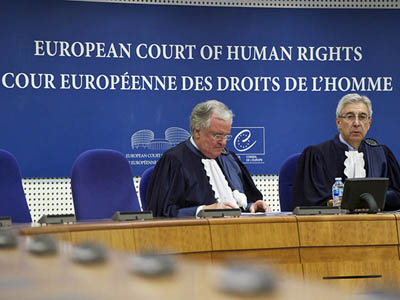
Article updated 11am, 22 May
A council breached a disabled woman’s human rights for almost a year by deciding to withdraw her night-time care without following the law, the European Court of Human Rights has ruled.
The court ruled that Kensington and Chelsea Council’s decision in November 2009 to provide Elaine McDonald with incontinence pads instead of night-time care to help her use a commode was an interference with her right to private life under Article 8 of the European Convention of Human Rights, on the grounds of compromising her dignity.
McDonald needs assistance to use the toilet because of severe mobility problems and has a neurogenic bladder that requires her to urinate two or three times a night. The court found that McDonald was asked to live in a way that “conflicted with her strongly held ideas of self and personal identity” as someone who was continent but being asked to behave as if she was not.
However, the court ruled that this interference with her Article 8 rights would have been fully justified had the council followed the law in doing so.
But at the time the decision to replace night-time care with incontinence pads was taken, McDonald’s assessed need was for “assistance to use the commode at night”, not for toileting in general.
So the decision involved a failure on the part of the council to fulfil its duty to meet McDonald’s assessed needs. It was only in November 2009, when her needs were reviewed, that the council assessed that McDonald’s needs were for night-time toileting and that incontinence pads were a “practical and appropriate solution” to this.
From that point on, the breach of human rights ceased, as the court also ruled that the council’s decision was a proportionate means of pursuing a legitimate aim, as is required by the European Convention on Human Rights.
“The court is satisfied that the national courts adequately balanced the applicant’s personal interests against the more general interest of the competent public authority in carrying out its social responsibility of provision of care to the community at large,” said the court.
“It cannot, therefore, agree with the applicant that there has been no proper proportionality assessment at domestic level and that any reliance by it on the margin of appreciation would deprive her of such assessment at any level of jurisdiction.”
As McDonald launched a judicial review against the council’s decision in December 2008, shortly after it was taken, it reached a compromise with her to provide night-time care four nights a week, with her partner providing support on the other nights.
However, all night-time care was withdrawn in September 2011, after the Supreme Court upheld Kensington and Chelsea’s decision to withdraw the care.
In light of the breach the court ordered the UK government to pay McDonald €1,000 in damages and to pay her £9,822 to cover her court and legal fees.
Caroline Abrahams, charity director at Age UK, said the decision was a “landmark ruling”.
“For the first time, the European court has said that failure to consider a person’s dignity can be a breach of human rights,” she said.
“The court also ruled that lack of action by a local authority or withdrawing care can be seen as a breach of human rights.
“In practice what this means is that if a local authority is considering cutting care services it will have to take into account the impact of the dignity of the individuals who will be affected.”
Stephen Bown, director of the British Institute of Human Rights, added: “Although not a complete victory for Ms McDonald, the ruling is a timely reminder that whilst tough economic decisions rest with the national authorities, those decisions must respect our basic human rights.”


 Bournemouth, Christchurch and Poole
Bournemouth, Christchurch and Poole  Hampshire County Council
Hampshire County Council  Lincolnshire County Council
Lincolnshire County Council  Norfolk County Council
Norfolk County Council  Northamptonshire Children’s Trust
Northamptonshire Children’s Trust  South Gloucestershire Council
South Gloucestershire Council  Wiltshire Council
Wiltshire Council  Wokingham Borough Council
Wokingham Borough Council  Children and young people with SEND are ‘valued and prioritised’ in Wiltshire, find inspectors
Children and young people with SEND are ‘valued and prioritised’ in Wiltshire, find inspectors  How specialist refugee teams benefit young people and social workers
How specialist refugee teams benefit young people and social workers  Podcast: returning to social work after becoming a first-time parent
Podcast: returning to social work after becoming a first-time parent  Podcast: would you work for an inadequate-rated service?
Podcast: would you work for an inadequate-rated service?  Family help: one local authority’s experience of the model
Family help: one local authority’s experience of the model  Workforce Insights – showcasing a selection of the sector’s top recruiters
Workforce Insights – showcasing a selection of the sector’s top recruiters 

 Facebook
Facebook X
X LinkedIn
LinkedIn Instagram
Instagram
Am I daft or does this article contradict itself? The ECHR dismisses her claim that reducing night time care breached her right to privacy but court did find that Kensington and Chelsea breached McDonald’s rights under Article 8 between 21 November 2008 and 4 November 2009????
It seems to hinge on the use of words rather than her human rights. Her assessment indicated she needed help with her commode at night rather than a more generalised needing help with her continence management. Once they changed the wording somehow her human rights were no longer being breached. It makes little sense and seems to make human rights a matter of a bureaucratic turn of phrase.